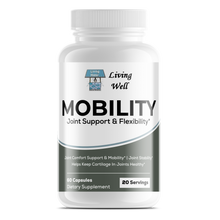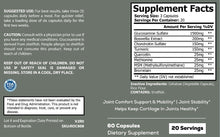ROC808 Joint Flex and Mobility Support
Our Joint Flex and Mobility proprietary blend offers great support and flexibility for joints.
The ingredients are considered generally safe and work together to provide the optimal support for mobility.
Glucosamine is a natural compound found in cartilage — the tough tissue that cushions joints.
In supplement form, glucosamine is harvested from shells of shellfish or made in a lab. There are several forms of glucosamine, including glucosamine sulfate, glucosamine hydrochloride and N-acetyl glucosamine. These supplements aren't considered interchangeable.
Evidence
- Osteoarthritis. Oral use of glucosamine sulfate might provide some pain relief for people with osteoarthritis of the knee. Some research shows that it may also help slow knee joint degeneration associated with osteoarthritis. More studies are needed to determine the benefits of glucosamine sulfate supplements for osteoarthritis of the hip, spine or hand.
- Rheumatoid arthritis. Early research suggests that oral use of glucosamine hydrochloride might reduce pain related to rheumatoid arthritis. However, researchers didn't see an improvement in inflammation or the number of painful or swollen joints.
Our take
Glucosamine sulfate might provide some pain relief for people with osteoarthritis. The supplement appears to be safe and might be a helpful option for people who can't take nonsteroidal anti-inflammatory drugs (NSAIDs). While study results are mixed, glucosamine sulfate might be worth a try.
- Nausea
- Heartburn
- Diarrhea
- Constipation
Other side effects may include:
- Drowsiness
- Skin reactions
- Headache
There's some concern that glucosamine might raise eye pressure. If you have glaucoma, talk to your doctor before taking glucosamine supplements.
Interactions
- Acetaminophen (Tylenol, others). Taking glucosamine sulfate and acetaminophen together might reduce the effectiveness of both the supplement and medication.
- Warfarin (Jantoven). Taking glucosamine alone or in combination with the supplement chondroitin might increase the effects of the anticoagulant warfarin. This can increase your risk of bleeding.
What the research says about Boswellia
Studies show that boswellia may reduce inflammation and may be useful in treating the following conditions:
* osteoarthritis (OA)
* rheumatoid arthritis (RA)
* asthma
* inflammatory bowel disease (IBD)
Because boswellia is an effective anti-inflammatory, it can be an effective painkiller and may prevent the loss of cartilage. Some studies have found that it may even be useful in treating certain cancers, such as leukemia and breast cancer.
Boswellia may interact with and decrease the effects of anti-inflammatory medications. Talk to your doctor before using boswellia products, especially if you’re taking other medications to treat inflammation.
Boswellia may stimulate blood flow in the uterus and pelvis. It can accelerate menstrual flow and may induce miscarriage in pregnant women.
Other possible sof boswellia include:
- nausea
- acid reflux
- diarrhea
- skin rashes
Boswellia extract may also interact with medications, including ibuprofen, aspirin, and other non-steroidal anti-inflammatory drugs (NSAIDs).
Bromelain is a protein-digesting enzyme mixture derived from the stem, fruit, and juice of the pineapple plant. It has a centuries-long history of being used to treat medical ailments, primarily throughout Central and South America.
It is currently categorized as a dietary supplement, and generally recognized as safe (GRAS) by the U.S. Food and Drug Administration (FDA).
Bromelain may be used alone or in conjunction with other medications. People use bromelain topically, to remove dead skin from burns, and orally, to reduce inflammation and swelling — particularly of the nasal passages.
Bromelain is also used as a digestive aid, for osteoarthritis, and to reduce soreness in aching muscles.





